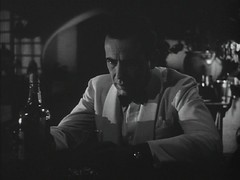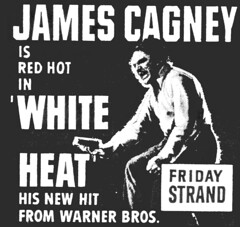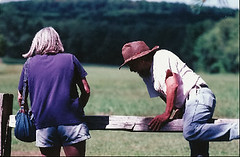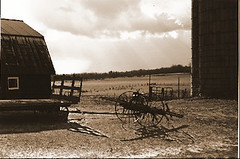Meet Me in St. Louis (1944)
Dir. Vincente Minnelli
Writ. Irving Brecher and Fred F. Finklehoffe, from the novel by Sally Benson
w/ Judy Garland, Tom Drake, Mary Astor, and Lucille Bremer
Meet Me in St. Louis must have been dismissed as a chick flick by the boys of its era; yet, it's not all sweetness and provinciality a love story in a turn-of-the-century American setting might otherwise produce. Self-contradiction sort of muddies the overall hue, as evidenced by its titular song, which gets sung plenty. Most of the "meeting" seems to take place in New York and the risque phrase "hoochie coochie" gets followed by the laughably innocent "tootsie wootsie." In short, it hails from a simpler time, a gentler time, gone forever like the twentieth century.
Coloring the film's events is a strong tendency to define the setting of St. Louis, a city steeped in a long, rich culture of steamboats and gambling, yes, but also of Scott Joplin's ragtime, hushed backwater speakeasies, slavery, and Mark Twain. Despite Techni-color's fully employed virtues, the film is still muted, less saturated than its look. It relies on stereotypes that generally get connected with that era: the spinster housekeeper who has no love of men, and the workaholic father who has no time for fun.
The lighter side showcases dancing and singing and other niceties, like the grandfather who takes his girl to the ball and produces her beau on the dancefloor from behind a Christmas tree. The darker side falls on the youngest daughter, Tootie, who receives the most attention. Hers is an odd child psychology, brought to a peak in a Halloween scene in which she gets released on the town to both trick and treat. The neighborhood children have started a fire out of old furniture, and she adds her bit to the mayhem, exuberating that she is the "most terrible."
Interestingly enough, while this is vintage Minelli, the real heart of the story lies with the little girl about whom the movie really is not. Her role as executioner to her dolls stands out at once as one of the more horrifying and inexplicable sequences in American film history. Could it be that her wee psychosis symbolizes a love-hate relationship with St. Louis itself, or is it supposed to signify a growing unrest considerably more normal to a child about to become nubile? Since her role comes from the autobiographical novel upon which this is based, an answer awaits, but the movie doesn't concern itself with that tiny corridor.
Instead, Meet Me in St. Louis moves on, following the lives and loves of the two older daughters whose stories may be more romantic but are far less earthy, believable, and ultimately explorable than Tootie's. If you watch it, watch it for her primarily, and for Judy Garland second. While it's not always easy to tell what's going on, musical lovers shouldn't be too disappointed, either.



















